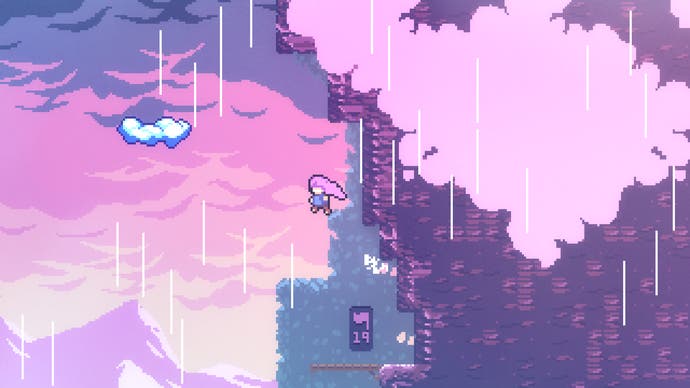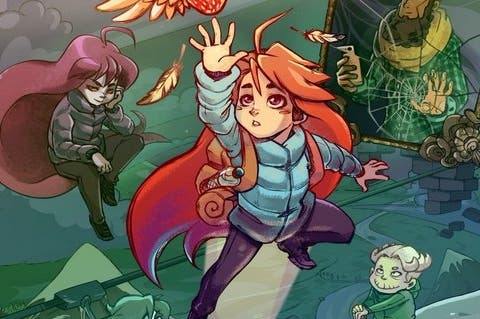Celeste review
The fall.
At the end of the first day of her attempt to climb Celeste mountain, Madeline sits down and lights a campfire. Flames crackling and sparks rising against the darkness, it's a moment of respite in a world defined by relentless, delirious challenge. We've been here before, of course, but, even if the nod to Dark Souls isn't intentional, it's entirely appropriate. Celeste offers ingenious delights and gruelling punishment. To master it, even partially, is to feel like you're really achieving something.
If the game's beautiful pixel art characters and landscape don't necessarily prepare you for the rigour that lies ahead, the lineage should. Celeste is from the creators of Towerfall, but while that game puts glorious platforming at the service of the single-screen party battler, creating a world where precision can look very similar to chaos (and vice versa), Celeste spins it out into a grand single-player adventure perfect for speedrunners. Madeline, battling demons that will probably be entirely familiar to many players, wants to climb a mysterious mountain. Between her and the summit lie ruined cities, ghostly hotels, jungles of glinting poisonous glass, mirror shrines, valleys beset by stormwinds and much more. She has no ropes or pitons or ice hammers, merely a decent jump, the ability to climb most surfaces, and a multi-directional air dash. That first level - the one that leads to that campfire - twists these elements together in exhausting, exhilarating ways. The game's remaining levels - and there are more of them than you might expect - subvert all expectations.
Even when Celeste is playing things straight it's a wonderfully challenging proposition. A platform will start to move when you jump onto it. Moments later, a gap will seem uncrossable until you realise that you can hurl yourself further if you use the moving platform's momentum to provide an extra shove. Carefully placed gems allow you to refresh your air dash without first hitting the ground. Pretty soon you are chaining moves together so confidently - or with the wild abandon encouraged by the fact that the game saves your progress at the start of each screen and offers endless restarts - that someone peering over your shoulder might think Celeste is a game about flying between platforms rather than jumping.

Onto this template, Celeste adds tweaks to the formula. Early on, you start to realise that the game is not a succession of single screen platform puzzles joined together in bland progression, but a complex map with secret entrances and exits and hidden chambers. That ghostly hotel twists things further, creating hub rooms with multi-part locks in which you venture off in all directions and then return with various kinds of keys. Levels start to tell their own stories: you meet another climber, a selfie-crazed wanderer undergoing a mid-twenties crisis, and a ghost who's unable to leave the clutter of the past behind. Collectables and an optional game timer, plus a stat that tracks how often you have died, prod even the clumsiest towards considering at least an attempt at speed-running, and then new gimmicks change things up even more: walls that are deadly to touch, clones that hunt you down and will take you out on contact, jump-pads, blocks of shimmering cosmic jelly, the occasional - and generally extremely mobile - boss.
What stops all this from descending into a chilly display of designer excellence is both the sheer density of the game's collectables and secrets and the unmistakable heart that powers the storytelling. Celeste is a game with a message, and its sense of kindness and acceptance is evoked both through the chunky sprites and 16-bit backdrops, and the beautifully simple cutscene art. Everything about Celeste speaks of care and attention: the level select screen is a tantalising low-poly model of the mountain itself, while each level contains a hidden room with an audio tape that allows you to unlock a devious B-side remix that's doubly brutal and challenging.
Even when it gets a bit much - and by the third or fourth level, Celeste was putting me through some of the most relentlessly precise platforming I have ever encountered - the game understands that such steep challenges may exclude many. If you can face hundreds of restarts on a single jump, you can at least take heart from the fact that you'll always spawn at most a few meters away from where you just expired. And for times that it becomes ovewhelming, you can dip into the assist menu and slow the speed of the game, perhaps, or grant yourself infinite air dashes, infinite stamina while clinging to walls, or even complete invulnerability. (Be careful, though: I once dropped down to invulnerability for twenty minutes only to find that when I returned to the game proper I had no idea how to proceed, because I had missed the incremental acquisition of a new way of thinking about things.)
For those who want the full experience, there are all those collectables to nab, all those secrets to find, and that timer clicking away while you toil. But this is truly a game for everyone. Celeste is brutal, but it's also sweet, and in its handling of the two elements it finds both a touching, timely narrative and an enviable sense of balance. What a game.








